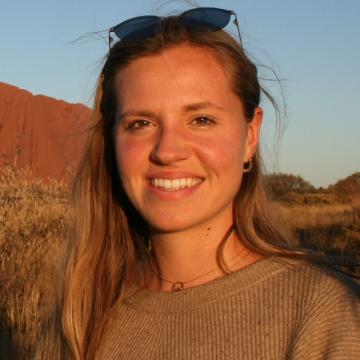Evelien Peeters

Doctoral fellow - Unit for Translational Research in Oncology (UTRiO), Department of Diagnostic Sciences (Faculty of Medicine and Health Sciences, UGent)
Principal investigator: prof. Steven Goossens (PhD) (promotor)
Doctoral fellow - Molecular and Cellular Oncology lab (UGent) - Inflammation Research Center (IRC)
Principal investigator: prof. Geert Berx (PhD) (co-promotor)
Research focus
An abundant supply of nutrients is essential for cancer cells to sustain their proliferative drive. While non-malignant cells can de novo synthesize sufficient levels of non-essential amino acids (NEAA), many cancer cells lose this ability and become auxotrophic for some NEAA: cancer cells have to take these up via their environment to sustain survival and proliferation. As a result, the NEAA bioavailability in the tumor microenvironment is a rate-limiting factor for the progression of various aggressive subtypes of cancers, like triple negative breast cancers (TNBC).
A recent report demonstrated that asparagine bioavailability determines the metastatic potential of a murine breast carcinoma model (1). We have confirmed independently that asparagine is indeed a determining factor of metastasis in TNBC breast cancer models.
One of the big questions remaining is where in the metastatic process the bioavailability of Asn is important. Further investigation using our in vitro ZEB1-inducible breast cancer cell lines demonstrates that breast cancer cells that undergo an epithelial-mesenchymal-transition (EMT) undergo a metabolic switch that results in a dependency for exogenous Asn uptake, which drives sensitivity of these invasive and circulating tumor cells to L-asparaginase treatment.
Other questions remaining that I am trying to uncover are whether asparaginase treatment could also be beneficial for other solid cancers and whether other amino acids could also crucial for breast cancer metastasis and thus a potential targetable vulnerability. Next to that, we are generating less toxic asparaginases, making long-term treatment of solid cancers with asparaginase finally possible.
Biography
- Master in bio-engineering: cell and gene technology
Key publications
- 'A human-like glutaminase-free asparaginase is highly efficacious in ASNSlow leukemia and solid cancer mouse xenograft models'. 2024. (PMID: 39709177)
- ‘In vivo stabilization of a less toxic asparaginase variant leads to a durable antitumor response in acute leukemia’. Haematologica, 2023. (PMID: 35979719)
- ‘Novel insights on the use of L-asparaginase as an efficient and safe anti-cancer therapy’. Cancers, 2022. (PMID: 35205650)
Contact & links
- Lab address: UZ Gent, Goossens lab, Medical Research Building 2 (entrance 38), Corneel Heymanslaan 10, 9000 Ghent, Belgium
- Goossens lab
- Lab of Molecular and Cellular Oncology
- Google Scholar
- ResearchGate
- Evelien Peeters is interested to receive invitations for presentations or talks